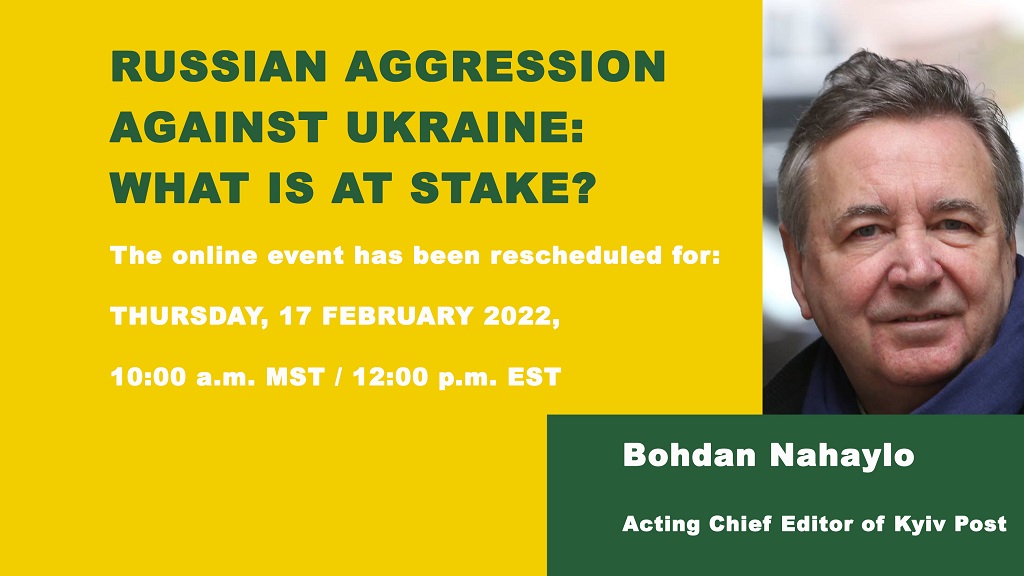Kateryna Bandura for New Pathway – Ukrainian News.
Russia’s recent recognition of the self-proclaimed Donetsk People’s Republic and Luhansk People’s Republic may be a worthwhile price for Ukraine’s chance at consolidated statehood and European democracy, a British-Ukrainian political analyst believes.
“Russia is out not only to destroy Ukrainian statehood, but to undermine it from within, to sow panic, to sow confusion, to send conflicting signals, remove the leadership in place, and thereby put in place a more docile puppet government regime that would serve its purposes,” said Bohdan Nahaylo on Thursday during his lecture “Russian aggression against Ukraine: What is at stake?” hosted by the Canadian Institute of Ukrainian Studies. Nahaylo is a British-Ukrainian political analyst, writer, journalist, and broadcaster in Ukraine.
Nahaylo said that if the Duma had voted to recognize the DNR and LNR as independent republics, that may have solved a big problem.
“Those occupied areas of Luhansk and Donetsk have been ethnically cleansed of anybody who had pro Ukrainian sympathies,” he said. “If the area has been depopulated in the sense of ethnic cleansing, then I think we have to be realists and [admit that] these are lost territories.”
He said that this way Russia would have to take responsibility and Ukraine could get on with the rest of its life and its Western orientation.
Nahaylo said that one of the challenges for Ukraine has been the consolidation of a modern Ukrainian nation, not in an ethnographic sense but in a political one. The second challenge is state building. Nahaylo said that Ukrainians have few periods in history where they managed to build a functioning, contemporary state.
“We need a deeper understanding of the history and a more focused attempt on creating [a consolidated state], not based on romantic thinking of what Ukraine has been about and what it has lost,” he said.
Nahaylo thinks that it is very hard for Russia today to overcome the reality that Ukraine is a very different place from what it used to be, especially when Putin is reviving the notion that Russians and Ukrainians are one people.
“That is perhaps the longer-term irony that the Russians don’t appreciate,” he said. “It will be Russian speaking Ukrainians and ethnic Russians defending Ukraine, and not so much the pro-Western Ukrainians.”
Another problem Nahaylo sees is that the Russian population is very poorly informed and is misinformed deliberately.
“I think it’s probably not reasonable for us to expect them to have a proper understanding of what’s happening in Ukraine and what contemporary Ukraine is about,” he said.
“Ukraine is not about placing NATO missiles next door to Russia. It’s not about aggression. It’s about peaceful coexistence…And this is what I think a lot of Russians, unless they travel and meet Ukrainians or read the press outside, don’t understand,” he said.
He said that Russian representation in the cyberspace is one sided.
“I think Russian civil society is in a very weak position because of Putin’s policies. Its leaders have been silenced, imprisoned, killed,” he said. “If Russian civil society had a chance to express itself more freely, we would hear 15-25 per cent of Russians saying, ‘Look, this is totally ridiculous to even plan a war against Ukraine.”
Nahaylo said it is very difficult to manage confusing information that Moscow deliberately delivers.
“On the one hand, it has concentrated massive forces on Ukraine’s borders in the East and in the north in Belarus. On the other hand, it is saying to the West, ‘We are not going to attack, we are not aggressive, these are just tactical maneuvers’.”
He said that the problem stems not from the West’s handling of the information, but from Moscow’s disbursement of the information.
“We have to remember that we are long into protracted hybrid warfare with various means of undermining not just Ukraine, but the West generally,” he said, adding that the West should be considering retaliatory, pre-emptive measures, not just closing North Stream or placing economic sanctions.
“This is not really appreciated fully in the West, this standoff between Putin and Ukraine and the West is not just about Ukraine. It’s not just about relations with NATO. It’s about the ongoing reconfiguration of Eastern Europe. And so [Putin] is trying to get the West to pressure Ukraine to make some kind of concessions.”
Nahaylo said that Ukraine is not strong enough to mitigate Russia’s escalating dominance in the region, but in unity with its Western allies, it can try to deter it.
This lecture is organized by the Contemporary Ukraine Studies Program, a research program of the Canadian Institute of Ukrainian Studies at the University of Alberta (Edmonton). CUSP’s mission is to develop contemporary Ukraine studies in the national Canadian and global intellectual contexts through cross-disciplinary and collaborative research, publishing, community involvement, and other projects that analyze the contemporary situation in Ukraine and within the broader comparative context of European, Transatlantic, Eurasian, Slavic, and post-Soviet studies.
This article is written under the Local Journalism Initiative agreement
Share on Social Media




































